 W
WAcademically Adrift: Limited Learning on College Campuses is a book written by Richard Arum and Josipa Roksa, published by the University of Chicago Press in January 2011.
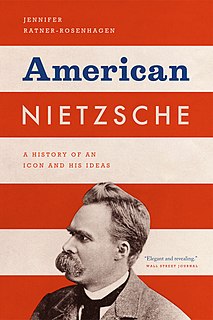 W
WAmerican Nietzsche: A History of an Icon and His Ideas is a 2011 book about the reception of Friedrich Nietzsche in the United States by Jennifer Ratner-Rosenhagen. It won the American Historical Association's John H. Dunning Prize (2013), Society for U.S. Intellectual History Annual Book Award (2013), and Morris D. Forkosch Prize for the Best First Book in Intellectual History (2013).
 W
WAristotle's Dialogue with Socrates: On the Nicomachean Ethics is a book by Ronna Burger in which she explores the influence of Aristotle's Nicomachean Ethics by approaching it as Aristotle's dialogue with the Platonic Socrates. The book was a finalist in philosophy in 2008 PROSE Awards.
 W
WThe Ashtray is a book by Errol Morris in which he criticizes the philosophy of Thomas Kuhn. In the book, Morris argues that Kuhn was a relativist and a philosophical idealist, contrasting his interpretation of Kuhn's views with his own epistemology, drawing on Hilary Putnam and Saul Kripke, which he describes as "investigative realism", based on the belief that there is an objective reality whilst rejecting naïve realism. Morris accepts that investigation of truth involves considerable effort, with no guarantee of reaching the absolute truth, and that knowledge can be attained "through reason, through observation, through investigation, through thought, through science".
 W
WBeing after Rousseau: Philosophy and Culture in Question is a book by Richard Velkley, in which the author offers an assessment of the position of Jean-Jacques Rousseau's thought within modern philosophy.
 W
WBigfoot: The Life and Times of a Legend is a non-fiction book written by Joshua Blu Buhs and published in 2009 by the University of Chicago Press. It explores the history of the concept of Bigfoot, discusses the exploits of its believers, as well as hoaxers, and examines the cultural influences that give the entity its staying power.
 W
WBlack Metropolis: A Study of Negro Life in a Northern City, authored by St. Clair Drake and Horace R. Cayton, Jr., is an anthropological and sociological study of the African-American urban experience in the first half of the 20th century. Published in 1945, later expanded editions added some material relating to the 1950s and 1960s. Relying on massive research conducted in Chicago, primarily as part of a Works Progress Administration program, Drake and Cayton produced, according to the Encyclopedia of African American History, a "foundational text in African American history, cultural studies, and urban sociology."
 W
WBlueprint for Disaster: The Unraveling of Chicago Public Housing is a history of the public housing program in Chicago.
 W
WThe Chicago Manual of Style is a style guide for American English published since 1906 by the University of Chicago Press. Its 17 editions have prescribed writing and citation styles widely used in publishing. It is "one of the most widely used and respected style guides in the United States". The guide specifically focuses on American English and deals with aspects of editorial practice, including grammar and usage, as well as document preparation and formatting. It is available in print as a hardcover book, and by subscription as a searchable website as The Chicago Manual of Style Online. The online version provides some free resources, primarily aimed at teachers, students, and libraries.
 W
WChristianity, Social Tolerance, and Homosexuality: Gay People in Western Europe from the Beginning of the Christian Era to the Fourteenth Century is a 1980 book about the history of Christianity and homosexuality by the historian John Boswell.
 W
WCommunitas: Means of Livelihood and Ways of Life is a 1947 book on community and city planning by Percival and Paul Goodman. The book is divided into ‘A manual of modern plans’ reviewing the conceptual history of twentieth-century planning and ‘Three community paradigm’, a series of utopias proposing answers to the central question of the book: ‘How to find the right relations between means and ends?’
 W
WThe Concept of Mind is a 1949 book by philosopher Gilbert Ryle, in which the author argues that "mind" is "a philosophical illusion hailing chiefly from René Descartes and sustained by logical errors and 'category mistakes' which have become habitual."
 W
WThe Constitution of Liberty is a book by Austrian economist and Nobel Prize recipient Friedrich A. Hayek. The book was first published in 1960 by the University of Chicago Press. It is an interpretation of civilization as being made possible by the fundamental principles of liberty, which the author presents as prerequisites for wealth and growth, rather than the other way around.
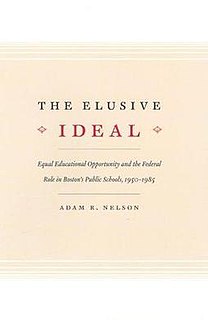 W
WThe Elusive Ideal: Equal Educational Opportunity and the Federal Role in Boston's Public Schools, 1950–1985 is a social history book written by Adam R. Nelson on the relationship between the Boston public schools and local, state, and federal public policy in the mid-20th century. The University of Chicago Press published the title in May 2005.
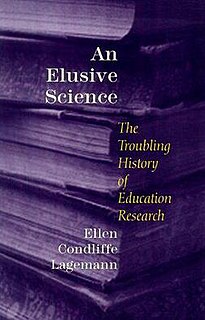 W
WAn Elusive Science: The Troubling History of Education Research is a history of American education research written by Ellen Condliffe Lagemann and published by University of Chicago Press in 2000.
 W
WThe Emergence of the American University is a non-fiction book in the history of education by Laurence Veysey, published in the 1965 by University of Chicago Press. It "trac[es] the development of the modern American university during its formative years from 1865 to 1910". It is based on and shortened from Veysey's doctoral dissertation.
 W
WThe Encyclopedia of Chicago is a historical reference work covering Chicago and the entire Chicago metropolitan area published by the University of Chicago Press. Released in October 2004, the work is the result of a ten-year collaboration between the Newberry Library and the Chicago Historical Society. It exists in both a hardcover print edition and an online format, known as the Electronic Encyclopedia of Chicago. The print edition is 1117 pages and includes 1400 entries, 2000 biographical sketches, 250 significant business enterprise descriptions, and hundreds of maps. Initially, the internet edition included 1766 entries, 1000 more images and sources.
 W
WMilton Friedman's book Essays in Positive Economics (1953) is a collection of earlier articles by the author with as its lead an original essay "The Methodology of Positive Economics." This essay posits Friedman's famous, but controversial, principle that assumptions need not be "realistic" to serve as scientific hypotheses; they merely need to make significant predictions.
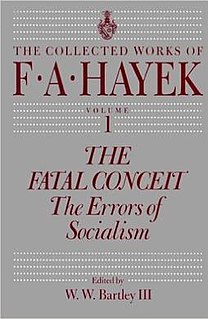 W
WThe Fatal Conceit: The Errors of Socialism is a book written by the economist and political philosopher Friedrich Hayek and edited by the philosopher William Warren Bartley. The book was first published in 1988 by the University of Chicago Press. Bruce Caldwell has questioned how far Bartley was the editor and how far the author.
 W
WFreedom and the End of Reason: On the Moral Foundation of Kant's Critical Philosophy is a book by Richard Velkley, in which the author offers an assessment of the position of Kant's philosophy within modern philosophy. Velkley focuses on “critique of practical reason” as the central issue of Kant's thought and argues that it is a response to the teleological problem of goodness of reason.
 W
WGod's Choice: The Total World of a Fundamentalist Christian School is a 1986 book written by Alan Peshkin and published by the University of Chicago Press. It is the product of his late 1970s 18-month ethnographic study of a 350-person Christian fundamentalist Baptist school in Illinois. He describes the K–12 day school's function as a total institution that educates about a singular truth and subordination before God. The final chapter is a comparative analysis of the school and other schools, institutions, and social movements, wherein Peshkin concludes that the school is divisive in American society for promoting intolerance towards religious plurality, the very condition that permits the school's existence.
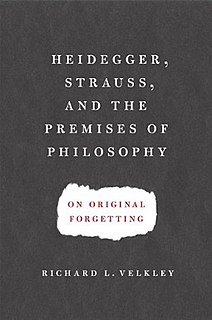 W
WHeidegger, Strauss, and the Premises of Philosophy: On Original Forgetting is a book by Richard Velkley, in which the author examines the philosophical relationship between Martin Heidegger and Leo Strauss. It has been translated into French and Chinese.
 W
WThe Hidden Wealth of Nations: The Scourge of Tax Havens is a 2013 book by French economist Gabriel Zucman, which popularized the concept of both the tax haven and corporate tax haven. The French publication was translated into English by Teresa Lavender Fagan. The foreword was written by Thomas Piketty, Zucman's PhD supervisor. Both Piketty and Zucman are critical of capitalism in its present form. Where Piketty's best-selling Capital in the Twenty-First Century was the catalyst for debate about inequality, Zucman targets individual and corporate tax havens. According to Zucman's research, $USD7.6 trillion representing about eight percent of global net financial wealth, is held in offshore accounts where no taxes are collected.
 W
WHistory of Political Philosophy is a textbook edited by American political philosophers Leo Strauss and Joseph Cropsey. The book is intended primarily to introduce undergraduate students of political science to political philosophy. It is currently in its third edition.
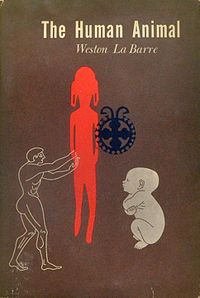 W
WThe Human Animal is a 1954 book by the anthropologist Weston La Barre, in which the author discusses the psychoanalytical approach to psychology and culture. The classicist Norman O. Brown described the book as the most significant attempt at creating a "general theory of language" through a synthesis of psychoanalysis with other disciplines.
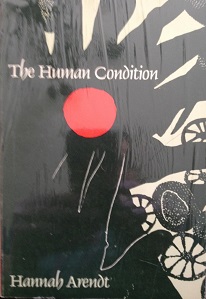 W
WThe Human Condition, first published in 1958, is Hannah Arendt's account of how "human activities" should be and have been understood throughout Western history. Arendt is interested in the vita activa as contrasted with the vita contemplativa and concerned that the debate over the relative status of the two has blinded us to important insights about the vita activa and the way in which it has changed since ancient times. She distinguishes three sorts of activity and discusses how they have been affected by changes in Western history.
 W
WIdeas Have Consequences is a philosophical work by Richard M. Weaver, published in 1948 by the University of Chicago Press. The book is largely a treatise on the harmful effects of nominalism on Western civilization since this doctrine gained prominence in the Late Middle Ages, followed by a prescription of a course of action through which Weaver believes the West might be rescued from its decline.
 W
WIndividualism and Economic Order is a book written by Friedrich Hayek. It is a collection of essays originally published in the 1930s and 1940s, discussing topics ranging from moral philosophy to the methods of the social sciences and economic theory to contrast free markets with planned economies.
 W
WKali's Child: The Mystical and the Erotic in the Life and Teachings of Ramakrishna is a book on the Indian mystic Ramakrishna by Hindu studies scholar Jeffrey J. Kripal, published in 1995 by the University of Chicago press. It argues for a homoerotic strain in Ramakrishna's life, rituals, and teachings.
 W
WKilling Time: The Autobiography of Paul Feyerabend is an autobiography by philosopher Paul Feyerabend. The book details, amongst other things, Feyerabend's youth in Nazi-controlled Vienna, his military service, notorious academic career, and his multiple romantic conquests. The book's title, Killing Time is a play on the homophone Feierabend, a German compound noun meaning 'the workday's end and the evening following it'.
 W
WKropotkin is a biography of the Russian anarchist Peter Kropotkin written by Martin A. Miller and first published in 1976 by University of Chicago Press.
 W
WMeaning and Necessity: A Study in Semantics and Modal Logic is a book about semantics and modal logic by the philosopher Rudolf Carnap. The book, in which Carnap discusses the nature of linguistic expressions, was a continuation of his previous work in semantics in Introduction to Semantics (1942) and Formalization of Logic (1943). Considered an important discussion of semantics, it was influential and provided a basis for further developments in modal logic.
 W
WThe Mental and Social Life of Babies is a 1982 book by Kenneth Kaye. Integrating a contemporary burgeoning field of research on infant cognitive and social development in the first two years of life with his own laboratory's studies at the University of Chicago, Kaye offered an "apprenticeship" theory. Seen as an empirical turning point in the investigation of processes in early human development, the book's reviews welcomed its reliance on close process studies of a large sample of infants and mothers (50) recorded longitudinally. It was republished in England, Japan, Spain, Italy, and Argentina.
 W
WMetaphors We Live By is a book by George Lakoff and Mark Johnson published in 1980. The book suggests metaphor is a tool that enables people to use what they know about their direct physical and social experiences to understand more abstract things like work, time, mental activity and feelings.
 W
WThe Mexican Dream, Or, The Interrupted Thought of Amerindian Civilizations is an English translation of an essay written in French by J. M. G. Le Clézio.
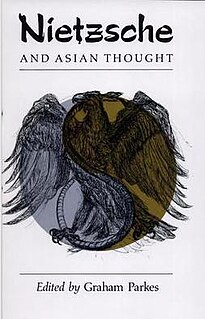 W
WNietzsche and Asian Thought is an anthology of essays by a variety of contributors on the relationship of the thought of German philosopher Friedrich Nietzsche to Asian philosophy; specifically, Indian, Chinese and Japanese philosophy. The book was edited by American philosopher Graham Parkes and was released in 1991 by the University of Chicago Press. The work was written for a Western audience of Nietzsche scholars and comparative philosophers, but features contributions from non-Western thinkers.
 W
WOedipus in the Trobriands is a 1982 book about the Oedipus complex by the anthropologist Melford Spiro, in which the author criticizes the research of the anthropologist Bronislaw Malinowski on the Trobriand Islanders. The work received positive reviews, and Spiro's criticism of Malinowski was compared to Derek Freeman's criticism of Margaret Mead in Margaret Mead and Samoa (1983).
 W
WOzone Journal is a 2016 Pulitzer Prize winning work by Peter Balakian.
 W
WThe Physical Principles of the Quantum Theory (German: Physikalischen Prinzipien der Quantentheorie publisher: S. Hirzel Verlag, 1930) by Nobel laureate (1932) Werner Heisenberg and subsequently translated by Carl Eckart and Frank C. Hoyt. The book was first published in 1930 by University of Chicago Press. Then in 1949, according to its copyright page, Dover Publications reprinted the "unabridged and unaltered" 1930's version.
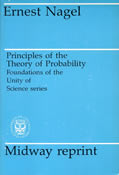 W
WPrinciples of the Theory of Probability is a 1939 book about probability by the philosopher Ernest Nagel. It is considered a classic discussion of its subject.
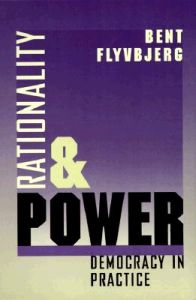 W
WRationality and Power: Democracy in Practice is a 1998 book by Bent Flyvbjerg, published by the University of Chicago Press. The book focuses on "the application of critical theory to urban and community development". Flyvbjerg here deploys the methodology for doing social science, which he developed in Making Social Science Matter (2001). Upon publication, the International Journal of Urban and Regional Research called Rationality and Power, "a notable addition to the literature," the reviewer adding, "I cannot think of a better account of how power relations are embodied in local governance."
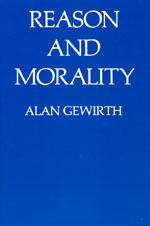 W
WReason and Morality is a 1978 book about ethics by the philosopher Alan Gewirth. The work for which he is best known, it received positive reviews. The work is defended by the legal scholar Deryck Beyleveld in The Dialectical Necessity of Morality (1991).
 W
WThe Rise of the West: A History of the Human Community is a book by University of Chicago historian William H. McNeill, first published in 1963 and enlarged with a retrospective preface in 1991. It explores world history in terms of the effect different old world civilizations had on one another, and especially the deep influence of Western civilization on the rest of the world in the past 500 years. He argues that societal contact with foreign civilizations is the primary force in driving historical change. In 1964 it won the National Book Award in History and Biography.
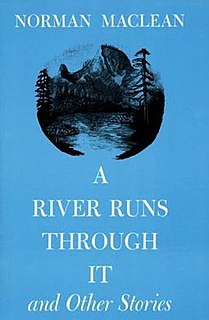 W
WA River Runs Through It and Other Stories is a semi-autobiographical collection of three stories by American author Norman Maclean (1902–1990) published in 1976. It was the first work of fiction published by the University of Chicago Press.
 W
WThe Road to Serfdom is a book written between 1940 and 1943 by Austrian-British economist and philosopher Friedrich Hayek. Since its publication in 1944, The Road to Serfdom has been an influential and popular exposition of right-libertarianism. It has been translated into more than 20 languages and sold over two million copies. The book was first published in Britain by Routledge in March 1944, during World War II, and was quite popular, leading Hayek to call it "that unobtainable book", also due in part to wartime paper rationing. It was published in the United States by the University of Chicago Press in September 1944 and achieved great popularity. At the arrangement of editor Max Eastman, the American magazine Reader's Digest published an abridged version in April 1945, enabling The Road to Serfdom to reach a wider popular audience beyond academics.
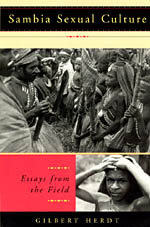 W
WSambia Sexual Culture: Essays from the Field is a 1999 book about the Sambia people and their sexual practices by the anthropologist Gilbert Herdt. The book received negative reviews, accusing Herdt of being biased in his approach and his conclusions.
 W
WScientific Man versus Power Politics is a 1946 work by realist academic Hans Morgenthau. The book is Morgenthau's first work and contains his most systematic exposition of a realist philosophy and a critique of a position he terms 'liberal rationalism'. Morgenthau argues that liberalism's belief in human reason had been shown to be deficient because of the rise of Nazi Germany and that emphasis on science and reason as routes to peace meant that states were losing touch with historic traditions of statecraft. The work marked out Morgenthau as the pre-eminent modern exponent of a Hobbesian view of human nature in international relations scholarship. Despite the contemporary association between (neo)realism and positivism Scientific Man has been considered a critique of attempts to place politics on a 'scientific' footing in works such as Charles Merriam's New Aspects of Politics.
 W
WSteps to an Ecology of Mind is a collection of Gregory Bateson's short works over his long and varied career. Subject matter includes essays on anthropology, cybernetics, psychiatry, and epistemology. It was originally published by Chandler Publishing Company in 1972.
 W
WStreet Corner Society is an ethnography written by William Foote Whyte and published in 1943. It was Whyte's first book. It received little attention when it was first published, but upon being reissued in 1955 it became a bestseller as well as a standard college text, and established Whyte's reputation as a pioneer in participant observation.
 W
WThe Structure of Scientific Revolutions is a book about the history of science by the philosopher Thomas S. Kuhn. Its publication was a landmark event in the history, philosophy, and sociology of scientific knowledge. Kuhn challenged the then prevailing view of progress in science in which scientific progress was viewed as "development-by-accumulation" of accepted facts and theories. Kuhn argued for an episodic model in which periods of conceptual continuity where there is cumulative progress, which Kuhn referred to as periods of "normal science", were interrupted by periods of revolutionary science. The discovery of "anomalies" during revolutions in science leads to new paradigms. New paradigms then ask new questions of old data, move beyond the mere "puzzle-solving" of the previous paradigm, change the rules of the game and the "map" directing new research.
 W
WThe Structure of Literature is a book of literary criticism written by Paul Goodman and published by the University of Chicago Press in 1954.
 W
WThe Truly Disadvantaged: The Inner City, the Underclass, and Public Policy is a book by William Julius Wilson. The book was first published in 1987; a second edition was published in 2012. It examines the relationship between race and poverty in the United States, and the history of American inner-city ghettos. The broad-ranging book rejects both conservative and liberal arguments for the social conditions in American inner cities. In it, Wilson argues that the decline of such conditions is due to "basic economic changes which radically altered the occupational structure of the central cities," such as the withdrawal of large industries from inner cities during the 1970s. He also criticizes the architects of the War on Poverty during the 1960s, saying that they focused too much on poverty as a problem of environment rather than as a problem of "economic organization".
 W
WYoung Men and Fire is a non-fiction book written by Norman Maclean. It is an account of Norman Maclean's research of the Mann Gulch fire of 1949 and the 13 men who died there. The fire occurred in Mann Gulch in the Gates of the Mountains Wilderness on August 5. The book won the National Book Critics Circle Award (1992).